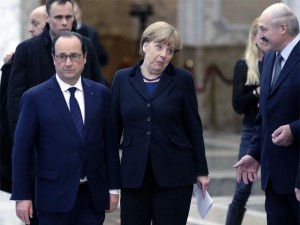Poland and Germany were both initiators and drivers of a New Eastern policy linked to the Eastern neighborhood and Russia/Soviet Union.
Andrei Yahorau: Ukraine can handle European integration

The forthcoming signing of Association Agreement put Ukraine into an awkward situation.
On the one hand, Kyiv must release Yulia Timoshenko until November 18. On the other hand, Russia threatens to close the Customs Union’s markets from Ukraine in case the Association Agreement is signed.
What are the chances that Ukraine signs the Association Agreement with the EU three weeks before the start of the Eastern Partnership Summit in Vilnius on November 28-29? It was the topic of discussion between the EuroBelarus Information Service and Andrei Yahorau, the head of the Centre for European Transformation.
— The perspectives look quite realistic. The negotiations about the options for the release of Yulia Timoshenko are being held now. Russia has also recently changed its attitude to Ukraine. Nowadays Moscow does not exclude possible cooperation between Ukraine and the Customs Union on “3+1” terms, that is its limited participation. This status allows Ukraine to simultaneously cooperate with the European Union and the Customs Union. At this stage the signing of the association agreement is hampered by the release of Yulia Timoshenko.
— How does the participation of Ukraine in the framework of the Customs Union conform to the opening of a free trade zone with the European Union?
— Russia has little leverage over Ukraine. What is more, the pressure on Ukraine will antagonize the Ukrainians from Russia to the EU side. Of course, Moscow may challenge the sale of Ukrainian goods, as well as dramatically send up prices for energy; though in this case Moscow will lose.
— How will the association agreement with the EU affect the economy of Ukraine? Ukrainian government say that in 10 or 15 years the country will have to modernize its economy which will cost about 160 billion euros, otherwise Ukraine will remain a raw material adjunct to the EU. These are the concerns expressed by Prime-Minister Azarov.
— In prospect the agreement with the European Union will open European markets to Ukraine. And modernization is in any way a useful and necessary process, even if it requires huge investments. Many Ukrainian enterprises will suffer, there is no doubt. But judging from the experience of the countries that have already gone through integration with the EU, the modernization is positive and tolerable and it will ultimately lead to an increase in the welfare. The process of integration with the EU is complex, but the process of joining the WTO was not less difficult. We cannot say that Ukraine is unable to cope with the challenges which this agreement sets to the country. The internal Kyiv-Brussels talks are being held and they are closed to general public. I think the situation with the association agreement with the EU will clear up two weeks before the Vilnius Summit.
Others
-
Uladzimir Matskevich: The sooner the "Union State" is denounced, the better for Belarus
Not only does the “Union State” undermine the establishment of civilized relations with Europe, but it hinders the possibility of normal relations between Belarus and Russia.
-
Uladzimir Matskevich: The regime can no longer control the situation in the country
The authorities are unable to prolong the social contract with the people: there is no way out of the social crisis.
-
Press release of the BNP in connection with the next round of the dialogue in the format of the EU-Belarus Coordination Group
Belarusan National Platform of the Eastern Partnership Civil Society Forum welcomes the dialogue process in the format of the EU-Belarus Coordination Group, the third round of which was held in Minsk on 3-4 April 2017.
-
Hennadiy Maksak: Europe must react adequately to the events in Minsk
A new wave of political repressions should make the EU return to tougher policy towards the Belarusan regime.








Comments
From farewell to a new Eastern policy and towards a new development
Poland and Germany were both initiators and drivers of a New Eastern policy linked to the Eastern neighborhood and Russia/Soviet Union.